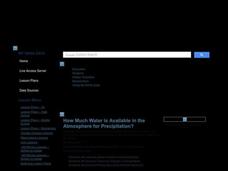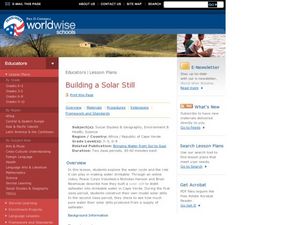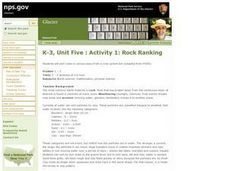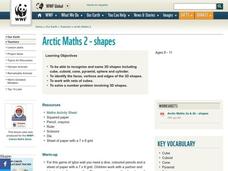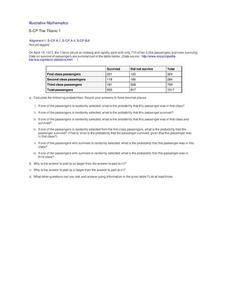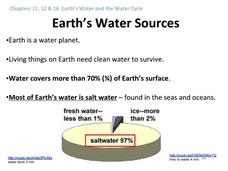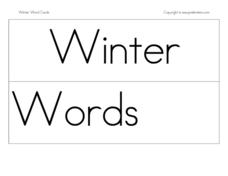Curated OER
Living in the Greenhouse
Students discuss the different types of climate zones found throughout the world. They participate in activities which relate to real events. They make observations and the consequences of their actions on the environment.
Curated OER
How Much Water is Available in the Atmosphere for Precipitation?
Students explore the relationship between the amount of water in the atmosphere available for precipitation and the actual precipitation observed by satellite. They examine seasonal changes in precipitation. They practice using Internet...
Curated OER
Building A Solar Still
Students investigate the water cycle by viewing an online video. In this drinking water instructional activity, students create solar stills at their campus in order to purify water that is tainted. Students view a video on...
Curated OER
Slip Slidin' Away
Students investigate mechanical weathering as a form of erosion. In this erosion lesson plan, students, define weathering and erosion before determining how the Earth's surface is in a constant state of change. They watch a video, access...
Curated OER
The Sinking of the Titanic
Investigate the sinking of the Titanic with young scholars. They will read actual documentation from the Titanic and answer questions. They will then draw conclusions from the pictures they see and information they read.
Curated OER
Google Earth Geology Field Trip
Students take a virtual field trip around California using Google Earth. For this geology field trip lesson, students explore landforms and a variety of rocks located in California. Students compare environments where rocks are...
National Park Service
Rock Ranking
Junior geologists sort rocks and soil. They separate a sample of river gravel by size, shape, color, and other characteristics. To include Common Core standards, you could have little ones graph the number of particles in each sample.
Curated OER
Rocks and Minerals
Review the difference between rocks and minerals using this resource. Learners identify and investigate the physical properties of these objects. They create a Venn diagram to compare and contrast types of rocks. This is a motivating way...
Curated OER
Regolith Formation
Students explain the difference between regolith formation on Earth and the Moon. In this space science lesson, students model the different factors affecting regolith formation on Earth. They identify the different types of weathering.
K12 Reader
United States Geography
Encourage reading for information with a text about United States geography. Kids read a short passage about the landforms in the United States, including mountain ranges and natural resources, and answer five reading comprehension...
K12 Reader
Water Water Everywhere
The protection of our water supply is the subject of an article used in this cross-curricular reading comprehension worksheet. After studying the passage, readers use information from the text to respond to a series of comprehension...
UAF Geophysical Institute
Carbon Footprint
Your young environmentalists can calculate their carbon footprint and discuss ways to reduce it with a worksheet about climate change. After reading a handout about what impact one's carbon footprint can have on the environment, kids...
Curated OER
Taco Grande
What do you use to chop an onion or brown the meat? Learners with special needs read through a taco recipe, then use it to complete three different academic development activities. They circle the best utensil for the job, match each...
World Wildlife Fund
Arctic Shapes
In a two-part worksheet, young geometers examine 3-D shapes and describe their attributes in a table. They will be able to draw the shape and name the number of vertices, faces, and edges. In the second part, individuals explore...
World Wildlife Fund
Shapes
Investigate the properties of three-dimensional figures with this Arctic-themed math lesson. Beginning with a class discussion about different types of solid figures present in the classroom, young mathematicians are then given a...
World Wildlife Fund
Land of the Midnight Sun
From days of 24 hour sunlight, to endless nights that last for days, the Arctic is a very unique place to live. Examine the seasonal changes that occur in the northern-most reaches of the globe and the impact they have on the plants and...
Curated OER
The Titanic 3
Can survival rates on the Titanic be explained by the "women and children first" policy or did rescue procedures favor the wealthy? Use actual historical data to explore conditional probability and independent events with your class....
Curated OER
The Titanic 2
Did the rescue procedures on the Titanic favor the first-class passengers? Use actual historical data to explore independent and dependent events with your class. Part of a series of worksheets, but can be used separately.
Curated OER
The Titanic 1
Were your chances of surviving the sinking of the Titanic better if you were a first-class passenger? Capture learners' attention with actual historical data to find the answer. They use two-way tables to calculate conditional and...
Curated OER
Exploring the Water Cycle
The water cycle is one of earth's most easily observable processes, but demonstrating each step within classroom walls can be a challenge. Through a series of videos and quick demonstrations, cover each aspect of the hydrologic cycle in...
Curated OER
Earth's Water Sources
General facts about Earth's water sources, human use, and the water cycle are outlined by this presentation. Slide three has a grammatical error and slide nine refers to the local watershed of the author, so you will need to make a few...
PreKinders
Winter Word Cards
Walk in a winter wonderland with a set of picture word cards. Kids work on their seasonal vocabulary with 18 cards, which include both pictures and names of winter items and animals that live in the cold.
San Francisco Public Utilities Commission
Let's Save Water: Water Conservation
Did you know that cutting down your shower by one minute a day can save five gallons of water? Learn about water conservation with a science reading activity. After kids finish reading key terms and water-saving tips in a reading...
San Francisco Public Utilities Commission
Water from the Well
How much water does it take to brush your teeth? How about to wash your clothes? Perform an experiment that measures water usage in everyday tasks and compares them to the days before indoor plumbing, specifically the California...
Other popular searches
- Icebergs
- Glaciers and Icebergs
- Iceberg and the Titanic
- Iceberg of Sea Ice
- Icebergs and Salinity
- Iceberg Hermit
- Iceberg Melting Rate
- Iceberg Hemingway
- Culture Iceberg
- Cultural Iceberg
- Iceberg, Limitation
- 2006 Atlantic Iceberg



